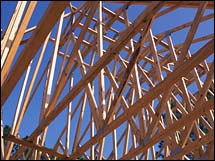 |
| A coming slowdown in building could cost 800,000 jobs in construction and finance according to a recent forecast. |
|
|
|
|
|
NEW YORK (CNNMoney.com) -
The expected downturn in the housing market could end up costing 800,000 construction and finance jobs, putting a big dent in economic growth over the next two years, a report from UCLA said.
But even with economic growth slowing as much as 1 or 2 percentage points, the nation should be able to avoid a recession, according to the widely watched report from UCLA Anderson Forecast.
The authors of the report admitted that they had forecast earlier this year that the slowdown in the housing market was going to start in mid-2005, which now looks like it was a little premature. But they noted that recent reports from home builders, real estate agents and the government indicate the slowdown may have now begun.
The report, released Wednesday, forecast a loss of 500,000 construction jobs and 300,000 jobs in the financial services sector from the housing slowdown, but noted that job losses would not spread across many industries, other than some limited pullbacks in manufacturing.
"We actually think that we're being somewhat optimistic in saying we don't see it spreading beyond that," Edward Leamer, director of UCLA Anderson Forecast, told CNNMoney.com. "There will be weakness in retail, for sure, and in manufacturing. But not widespread losses."
Still, there are risks to the economy due to the housing slowdown, according to the school's report.
Its research shows that nine of the previous 12 drops in spending on residential housing were followed by recessions, and the latest report forecasts a decline in spending ahead.
But Leamer said the lack of the job loss in other sectors it the key to keep the economy out of recession, and keep the housing slump from being more severe.
"Housing is in a perilous position, ...(but) housing alone cannot constitute a recession," Leamer wrote in his section of the forecast, which is titled "No Recession Any Time Soon, But Troubles Ahead, Nonetheless."
The Anderson Forecast does not make a firm prediction on whether there will be broad or deep decline in home prices nationwide in the coming housing slowdown.
But it warns, "these may all be indications of an incipient decline in the housing market." It said its next forecast due early next year should have a better indication on home price direction.
Still, Leamer said that even if housing prices fall nationally, he doesn't expect a steep drop.
"Housing is driven by two things, one is jobs, one is interest rates," he said. "Unless you get severe job loss in a particular market that forces people to sell, the market recalibrates slowly to the overpriced status."
The forecast points to a number of factors for the coming slowdown in housing, including rising mortgage interest rates, slowing population growth, overbuilding and prices that had reached bubble-like heights in some hot real estate markets.
"On all these grounds, we believe housing is due for a sustained decline," wrote Michael Bazdarich, a senior economist with the Anderson Forecast. "The remaining questions are how hard the fall will be and when it will begin. Again, the recent anecdotal evidence suggests the decline may be beginning. We'll soon see for sure."
The report is just the latest in a series of readings suggesting a slowing real estate market ahead.
Thursday, major home builder Toll Brothers (Research) reported strong results for 2005 but warned that 2006 would be affected by a slowing real estate market, as it cut its earnings guidance for the coming year.
"It appears that the housing market is not as robust today as it was throughout 2004 and through the summer of 2005, although there is wide variation in local markets," said the company in its earnings report.
"Many believe the deceleration in price growth was inevitable, as the increases of 2004 and most of 2005 were not sustainable and were fueled, in part, by speculation," the company's report continued.
"Our sales results indicate that housing demand is returning to the more normalized levels of the decade from 1994 to mid-2003, before home prices really took off in quite a few markets."
________________________
For another look at the jobs impact of a housing slump, click here.
Are real estate investors bailing out? Click here.
For a look at Americans fleeing overheated real estate markets, click here.
How will a housing slump hit consumer spending? Click here.
For more on the state of real estate and what it means to you and the economy, click here.

|